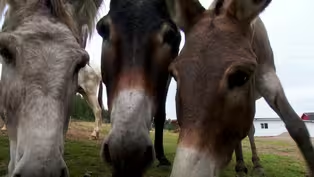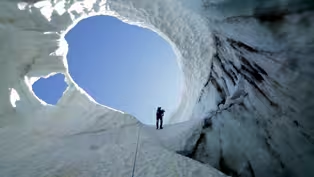Oregon Field Guide
Oregon’s Abandoned Boats: A Growing Crisis on Our Rivers
Clip: Season 37 Episode 1 | 10m 15sVideo has Closed Captions
Beneath the peeling paint and rusted decks of derelict boats, there's a deeper human story.
Oregon’s waterways face a crisis as abandoned and derelict boats pile up. Left behind by owners unable to cover costs, many become floating hazards or precarious shelters for people with nowhere else to go. The result is a collision of housing insecurity and public safety, with removal costs that can exceed $1 million for a single vessel.
Problems playing video? | Closed Captioning Feedback
Problems playing video? | Closed Captioning Feedback
Oregon Field Guide is a local public television program presented by OPB
Oregon Field Guide
Oregon’s Abandoned Boats: A Growing Crisis on Our Rivers
Clip: Season 37 Episode 1 | 10m 15sVideo has Closed Captions
Oregon’s waterways face a crisis as abandoned and derelict boats pile up. Left behind by owners unable to cover costs, many become floating hazards or precarious shelters for people with nowhere else to go. The result is a collision of housing insecurity and public safety, with removal costs that can exceed $1 million for a single vessel.
Problems playing video? | Closed Captioning Feedback
How to Watch Oregon Field Guide
Oregon Field Guide is available to stream on pbs.org and the free PBS App, available on iPhone, Apple TV, Android TV, Android smartphones, Amazon Fire TV, Amazon Fire Tablet, Roku, Samsung Smart TV, and Vizio.
Providing Support for PBS.org
Learn Moreabout PBS online sponsorship(machinery rumbling) - [Narrator] Boats like this used to be symbols of industry and prosperity.
But now, they're just collections of rusted metal and broken fiberglass.
They're known as abandoned and derelict vessels, or boats that are no seaworthy, and they're found all over Oregon and the Pacific Northwest.
They can pose threats, like oil leaks, navigation hazards, and damage to underwater habitats.
But identifying derelict boats isn't always straightforward.
It requires collaboration between public agencies, private organizations, and everyday citizens, with many factors at play.
The first step is figuring out where they are.
- Today, we're out in the Multnomah Channel with the Multnomah County Sheriff's Office, and we're going to be looking for abandoned and derelict vessels, and we'll be placing pre-seizure notices on the boats.
- [Diekmann] There's probably a high likelihood that that boat that's there might be occupied.
So we'll take a look and see what's happening.
- Hello!
- [Narrator] Boats can legally anchor in one spot for up to 30 days.
Anything longer than that tends to draw the attention of law enforcement, especially if they're not registered.
- (knocking) Sheriff's Office!
- I wouldn't call it a derelict boat, but it's at anchor without registration on this state.
So we'll go ahead and put a tag on this and see if they'll follow up with us.
(sticking notice on boat) All right, we're good.
- [Narrator] If the boat isn't removed and the owner doesn't contact the state, a post-seizure sticker comes next and the vessel becomes state property.
- Who are you guys?
- I'm with the Marine Board.
- Marine Board?
- Look at that.
- Yeah.
- I figured as much.
You've got the Marine Board hat.
- The funds for your vessel registration pays for Deputy Barrett, Deputy Diekmann, and this boat to be out here to be able to respond.
- Yeah, awesome.
That's what I want.
- Yeah.
Yeah.
- You definitely need it registered though.
- It's a sensitive area where we're not gonna necessarily go remove housing or, I don't wanna say housing, but shelter from somebody who might otherwise be houseless, right?
- Yeah.
- In that circumstance.
- Sure.
- So it's a little bit of a controversial subject, but you gotta kind of just be sensitive to it, right, and do what we can.
- No registration.
Mm-hmm.
So is he living on the boat?
- I had met him about a week ago riding around the country on a bicycle, so, you know, I don't know.
- I'll put a sticker on the back of the boat, you know, and it'll have my phone number on it, but he needs to call me.
If not, we're gonna go through the process of, you know, taking the boat.
- All right, you be safe.
(water sloshing) - [Narrator] Oregon's been ramping up efforts to clear derelict boats from its waterways.
- [Diekmann] Where did this red one come from?
- [Barrett] That's what we were just asking.
- Yeah, we were just asking.
- [Diekmann] That one looks rough.
- [Phil] Although it's got a blue sticker on it, so I think it's-- - Not bad.
- Yeah.
- Well done.
- It's currently registered, so-- - [Barrett] Let me go and run it real quick.
- [Narrator] Many boats have already been pulled from the Columbia and Willamette Rivers, but removal isn't cheap, running from 5,000 to over a million dollars per vessel.
And as old boats are removed, new ones often take their place.
(birds cawing) Aaron Bretz manages the day-to-day operations of the Port of Newport.
He has a group of derelict vessels in his marina waiting to be disposed of.
But getting rid of these boats isn't as simple as towing a car.
- Somebody abandons a vehicle in your parking lot, you put a sticker on it, you wait the required time, you call a tow truck company who has an impound lot.
In the marine world, there isn't any such thing, because they're much larger and there's a lot more expense involved.
If you go back long enough, a lot of the wooden boats that weren't any longer in service, a lot of times they would just push them up on shore someplace and burn them.
There's a higher threshold for that sort of activity nowadays, and with that comes more cost.
It's more expensive and it's a little more difficult to do it.
It's a pretty complex issue.
- [Narrator] That complexity is highlighted by this 100-foot dredge, which takes a massive amount of labor, resources, and coordination to remove.
In situations like this, the state will typically rely on contractors who have the space, tools, and know-how to dismantle a vessel this big.
- We've been contacted by the state to move the vessel and put it into our dry docks where we can dismantle it safely there, where we do not have an environmental release of any fluids that may still be in the vessel that we don't know about.
This operation will cost just slightly a little bit north of a million dollars when we're all done.
- We're looking at the Dredge Herb Anderson in a dry dock behind me here.
This vessel was up in Rainier for decades, and we determined that it was time for the state to have to intervene on this.
It was presenting a navigational hazard, environmental hazard.
And just to get it here, there was an immense amount of very technical work that had to happen.
- [Narrator] So who's paying for all this?
Oregon has pulled together millions in a combination of federal grants and lawsuit settlements, while the Marine Board contributes a share from voter fees.
But whenever possible, the state still tries to make the boat's owner cover the cost first.
(engine roaring) This fishing boat in Charleston was seized by the state.
It's being temporarily held in a shipyard.
- So this is the vessel Miss Stacey.
It was moored illegal on department state lands.
We're assisting the state of Oregon by providing a haul-out location for them.
What we're doing right now is our staff is scraping all the barnacles off of it.
There's a process we have to go through to make sure that everything is environmentally safe.
(tool scraping) Our goal is not to take somebody's boat.
We want people to be able to take care of their own boats, but ultimately people get into a situation where they're not able to, whether it's financially, or they don't have the knowledge, or whatever the situation is.
- [Narrator] The owner was living on this boat when it was taken.
And if it's not repaired, it'll probably get demolished by an excavator and end up in a landfill.
- [Zora] So let's carry both in.
- [Narrator] Zora Hess knows a lot about life on the water.
She takes regular kayaking trips down the Willamette River, making house calls along the way.
- Most people are out here working.
And it's really hard to work when you have not a stable home, they don't have an address.
It's really impossible, because your being alive is a full day job, but people still do.
And, you know, I always approach people and I always have lovely conversations.
Hi, I'm Zora.
I will bring some food.
- Okay, if I'm not here, I guess you can-- - I'm just gonna drop it off here?
- Yeah.
We've been living out here for two years now.
We're homeless, you know, we're struggling.
Most of these marinas want a 12-year contract at 350 a month.
I mean, we can't afford a registration, let alone 350 bucks a month, you know?
- [Narrator] Pete Sostilio bought his boat in an auction for well below market value.
These low-cost boats usually require significant repairs and are often nonoperational.
Pete also lacks registration, which means his boat could be targeted for seizure.
(water sloshes) (dog barks) - Hey, Steve, are you sleeping?
How are you doing with food?
- Low.
- Okay, I have just a little bit with me.
So you got some bread.
- I can make some tuna fish sandwiches.
I've lived in this boat for 16 years.
Sheriffs come by.
They don't bother me.
They're pretty nice about things.
I'm all legal.
I got my registration right there.
- So this is for, some of the old bags are more for the winter.
But it has a battery.
- Oh, yeah.
- [Narrator] Steve Dusek is up to date on his registration and his boat is operational, but he refuses to pay to moor at a marina.
He prefers living on the water, because of the rising costs of living on land.
- When all your social security money goes out to your rent, you don't have much money left for doing anything.
Everything is just so expensive.
- [Narrator] At first glance, a lot of derelict boats might seem like an eyesore, but beneath the peeling paint and rusted decks, there's a deeper, more human story.
- [Dwire] Basically, our shipyard is halfway full of just vessels that have been abandoned that we need to take care of.
Ultimately, you've got dreams here that just don't become reality.
Somebody doesn't have the ability to take care of it, or the financial backing, or it was just too big of a project for them, so it's harder and harder, and harder all the time to make it work.
- [Narrator] It's a complicated issue with no simple solution.
At one point, these boats were someone's prized possession, a means of adventure or livelihood.
Now, they're worn and weathered relics, no longer destined for life on the water.
(wind whooshing) (no audio) (no audio)
Video has Closed Captions
Clip: S37 Ep1 | 8m 55s | The Oregon Donkey Sanctuary is home to abandoned and abused donkeys and a refuge for humans (8m 55s)
Video has Closed Captions
Clip: S37 Ep1 | 6m 27s | After 25 years of illuminating Oregon’s landscapes with OPB, Ed Jahn passes the headlamp. (6m 27s)
Providing Support for PBS.org
Learn Moreabout PBS online sponsorshipSupport for PBS provided by:
Oregon Field Guide is a local public television program presented by OPB

















